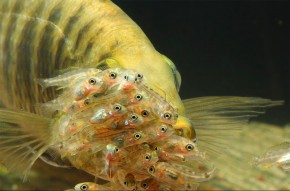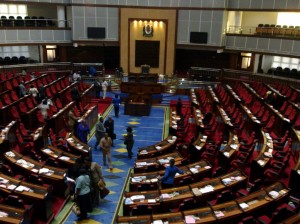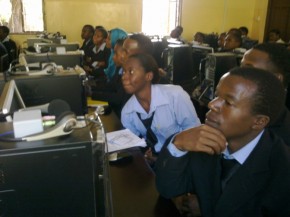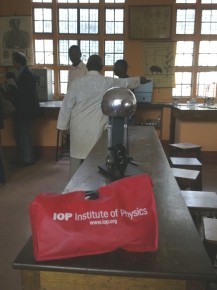
While the UK basked in the glory of Team GB's medal haul at the London 2012 Olympics, I spent a week driving up from Zimbabwe to Dar es Salaam, to start my new assignment as DFID’s Education Adviser in Tanzania.
The highlight en route was definitely seeing the cichlid mother fish in Lake Malawi (Lake Nyasa), that suck up their offspring into their mouth as danger (i.e. me scuba-diving) approaches. The BBC’s Planet Earth captured this and other amazing scenes from this huge freshwater body back in 2006. The only hiccup on route was with my car's paperwork at the Malawi-Tanzania border, but with a cold Tusker beer and Olympic beach volleyball on the bar TV, a six hour delay quickly melted away as the problem was slowly resolved!

Before the dust could settle in Dar es Salaam, I was at once dispatched 500 km inland to the actual capital of Tanzania - Dodoma, where the Parliament known as the Bunge was in session. The event was the annual education budget debate, which I witnessed in the magnificent modern parliament chamber, complete with a 'Speaker of the House' and ceremonial mace - all being beamed out live on TV.

It was a real pleasure to observe parliamentary democracy in action, with the government presenting its budget plans and the opposition and Bunge social sector committee MPs retorting with pointed criticism and demands for action around delayed teacher salary bonuses, strikes and plunging examination results and education quality (sounds familiar?). Perhaps most telling were the anecdotes MPs cited from the advocacy group Haki Elimu (Right to Education) that over 5,000 new secondary students were identified as being completely unable to read nor count.
Tanzania has clearly made great progress over the last decade, with impressive cuts in child mortality and school enrolment surging. However familiar factors such as surging population growth, high unemployment, bureaucracy and the slow pace of change are all very real constraints.

DFID, together with other development partners, will be working collectively with the Government of Tanzania to find solutions to the issues raised in the Bunge - especially on improving actual learning outcomes for Tanzanian children.
Visiting the Bunge was an ideal introduction to the country and an impressive display of parliamentary democracy in action. I really look forward to living and working in Tanzania, to experience the incredible natural beauty and hopefully to support the reversal of the recent plunging schools' examination scores!

7 comments
Comment by Jane Wall posted on
Ian - PLEASE get in touch. I am the Academic Head of a large (1600) all-age charity school near Arusha. We are aiming to deliver the National Curriculum using all local teaching staff who are receiving professional development from western teacher mentors. We have excellent facilities including very well equipped Science labs and Computer labs and are committed to providing good teaching resources. Through working with the Headmasters we are trying to remove the emphasis on exams and focus on sound teaching and learning methodologies. Our first group of F4 students are about to sit for their national exams and already the school is being identified within the zone as one which is producing excellent results. Heads of Schools are being encouraged to visit the school in order to see what we are doing and I am encouraging our leaders to get involved in any forum which is committed to reform. I have read as extensively as possible the various education development plans and other academic papers and would love the opportunity to be a part of the reform which is needed. Would love to hear from you.
Comment by Dave posted on
Is the picture of the lady fish sucking up her little fishlets a metaphor for something?
Comment by Ian Attfield posted on
Dave, I'm sure the mouth brooding fish can be construed to have a deeper meaning on aid and development power relationships, but I just thought they were fascinating when I saw them while diving. Honest!
Comment by Ian Attfield posted on
Jane, great to hear about your school and its approach on holistic learning, I'm sure if exam results are good you will generate a lot of interest on how you achieve the provision of a well rounded, excellent education.
At the moment from my limited time in Tanzania I gather the network TENMET /www.tenmet.org/ act as an NGO forum on education who may be well placed to be in contact with. They engage in dialogue directly with both governmetn and development partners.
Driving up education quality is a shared priority, wishing you every success in your school's endeavours!
Comment by Jane Wall posted on
Thanks for the link Ian. I have read publications from Tenmet but haven't so far been involved. I have now suggested that my Headmasters and other academic leaders become involved. If you are visiting the Arusha region at any time, we would love for you to visit the school and I would really appreciate the opportunity to engage in further dialogue. http://www.schoolofstjude.org. Many thanks.
Comment by Eunrea Kim posted on
Dear Ian Attfield,
I have tried to contact you with the given normal email format of DFID since August. Your emaill address might not follow the format of DFID. I am conducting research here in Tanzania concerning in-service teacher training (INSET) for quality science education at secondary and local levels in Muheza, rural Tanzania. My school supervisor, Rosemary McGee at the Institute of Development Studies, University of Sussex, UK, introduced you, because DFID has concerned the importance of secondary education for development, especially in Sub-Saharan Africa, and DFID is one of the most significant international donor groups in the education sector in this country.
I would like to share my working paper based on my research findings this year. You might be interested the reality of the secondary science education in rural Tanzania. Could you contact me via email?
Best wishes,
Eunrea.
Comment by Jane Wall posted on
Eunrea Kim - I would be very interested in reading more about the reality of Science education in rural Tanzania. I have read the UNESCO study http://www.unesco.org/new/fileadmin/MULTIMEDIA/HQ/SC/pdf/sc_A_Needs_Assessment_Study_of_Tanzania_Science_Education.pdf and have also tried to contact the authors. Would love to put all heads together in one place! Please feel free to contact me at The School of St Jude.